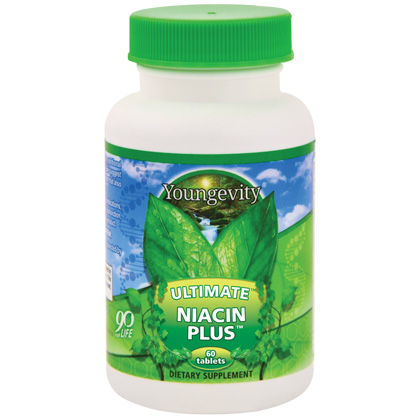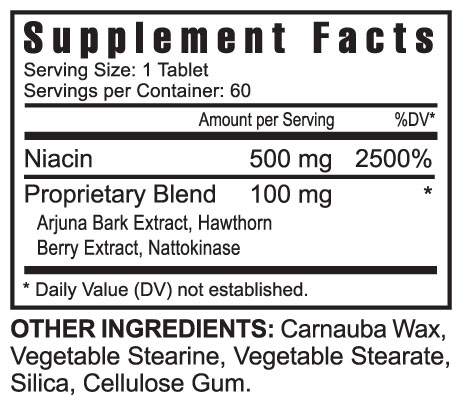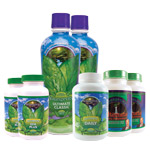

| BIOMETRICS | BEYOND ORGANIC | BLOOD/SUGAR | PROBIOTICS | DETOX | EFA's | |
| MULTI VITAMINS | MINERALS | JUST VITAMINS | INTEGRIS | SHAKES | SOZO PRODUCTS | FREELIFE |

|
|
||
| Option 1 (Good) | Preferred Customer Signup to be able to purchase at the Wholesale :FREE | |
| Option 2 (Best) | Youngevity Business Starter Kit Youngevity Distributor Welcome Pack gives you the tools and resources you need to start up your Youngevity business. $30.00 | |
| Option 3 Youngevityy Member already. |
Use Add to Cart to let us know that you are a member. NO ADDITIONAL COST TO MEMBERS | |
Ultimate Niacin Plus™ - 60 tablets
Heart attack risk is associated to high Homocysteine Levels, which is one of the amino acids found in everyones blood. Studies show that levels above 14 are considered high, which can lead to 15% of Heart Attacks and 30-40 percent of Strokes. It is not always High Cholesterol that is the danger. Sometimes a genetic disease can cause even young people to suffer clogged arteries as was discovered by a Boston Massachusetts General Hospital doctor in the 1960's. Article from Sept, 1998 Readers Digest March 7, 2001 Study confirms B vitamin supplements association with lower homocysteine A study of participants in the Framingham Offspring Study, consisting of children of participants in the original Framingham Heart Study, confirmed the association between fasting plasma homocysteine and the intake of B vitamins of dietary and supplementary source. Homocysteine is a non-protein forming sulfur amino acid which has been found to be a risk factor for cardiovascular and other diseases when blood levels are elevated. The study examined data from 1,960 men and women between the ages of twenty-eight and eighty-two from the 1991 to 1994, before the implementation of folic acid fortification in the United States. Examination of the study participants included testing for levels of fasting plasma homocysteine, folate (a determination of folic acid status), vitamin B12, and pyridoxal-5'-phosphate, which is the active circulating form of pyridoxine, or vitamin B6. Dietary intake questionnaires assessed the amounts of nutrients consumed from food and supplements. Homocysteine levels were higher in men than in women and higher in individuals over 65 years of age than in those 45 years old or younger. In the group having the lowest folate concentrations, homocysteine levels were 49% higher than those who in the group with the highest folate concentrations. A similar, but less dramatic association was seen with vitamin B12. Supplementation with B vitamins was associated with 18% lower homocysteine levels than that of nonsupplement users. Smoking, the use of antihypertensives (but not hypertension), and alcohol and caffeine consumption were all associated with an increase in homocysteine. The study, published in March's American Journal of Clinical Nutrition, reiterates the advisability of B vitamin supplementation rather than reliance on dietary nutrition as optimal in preventing the dangerous elevation of homocysteine levels.
February 26, 2001 The February 26, 2001 issue of Archives of Internal Medicine published the results of a study that examined 14,129 patients aged sixty-five and older who were hospitalized for an acute myocardial infarction. Twenty-six percent of the participants received a regimen consisting of aspirin alone, 20% received angiotensin-converting enzyme inhibitor (ACE inhibitor) drugs, 38% received both drugs and the remaining 16% of the participants received neither of the drugs. Aspirin and ACE inhibitors have both been shown to help prevent a second heart attack in acute myocardial infarction survivors. Because several studies had indicated a possible negative effect when both aspirin and ACE inhibitor drugs were combined, the study sought to further investigate this possibility. After one year, the study participants who had taken the drugs experienced a significantly lower mortality than those who received neither drug. The participants who received both drugs experienced a slightly lower mortality than those who were on either aspirin or ACE inhibitors alone, however the researchers considered this to be an insignificant difference. The study reconfirmed the survival enhancing benefit of aspirin or ACE inhibitor drugs in patients at risk for a second heart attack, and demonstrated that the combination of the two drugs not only failed to negatively impact this benefit but slightly enhanced it. February 23, 2001 The February 2001 issue of Stroke: Journal of the American Heart Association published the results of a study in which atherosclerotic lesions were examined and the majority found to contain the bacteria H pylori, a known cause of stomach ulcers. Recent evidence has implicated inflammation and possible infection as playing causative roles in atherosclerotic vascular disease, with Chlamydia pneumoniae, herpes simplex 1 and 2, hepatitis A, cytomegalovirus and H pylori diagnosed more often in people with atherosclerosis. Acute infections frequently precedes stroke and heart attack, possibly acting as a trigger. While several of the above noted infectious agents have been isolated from atherosclerotic lesions, H pylori's presence had not previously been confirmed. Thirty-eight specimens were obtained from patients undergoing carotid endarectomy and seven were obtained from autopsied subjects who did not have atherosclerosis of the carotid artery. Twenty of the thirty-eight atherosclerotic plaques tested positive for H pylori while none of the nonatherosclerotic normal carotid arteries contained the bacteria. The presence of the bacteria was not associated with previous neurologic symptoms, vascular risk profile or age, but was more prevalent in samples taken from men than women. The authors believe that the failure of previous studies to detect H pylori in vascular lesions was due to less sensitive methods of detection. They conclude that infectious processes are implicated in the occurrence of cerebrovascular disease and offer three possible mechanisms of action: first, that acute infections may precipitate ischemic events due to their effect on coagulation; second, that chronic infection in remote sites can cause an increase in atherosclerotic load; and third, that the microorganisms themselves contribute to atherosclerosis by their presence in the artery wall, either by initiating the plaque or furthering its progression.
Youngevityy Products  FULL TIME SERVICE CENTER
True Health ORDER HOT LINE TOLL FREE : Phone: (888) 249-4464
Minerals are essential to life itself! |
||||



